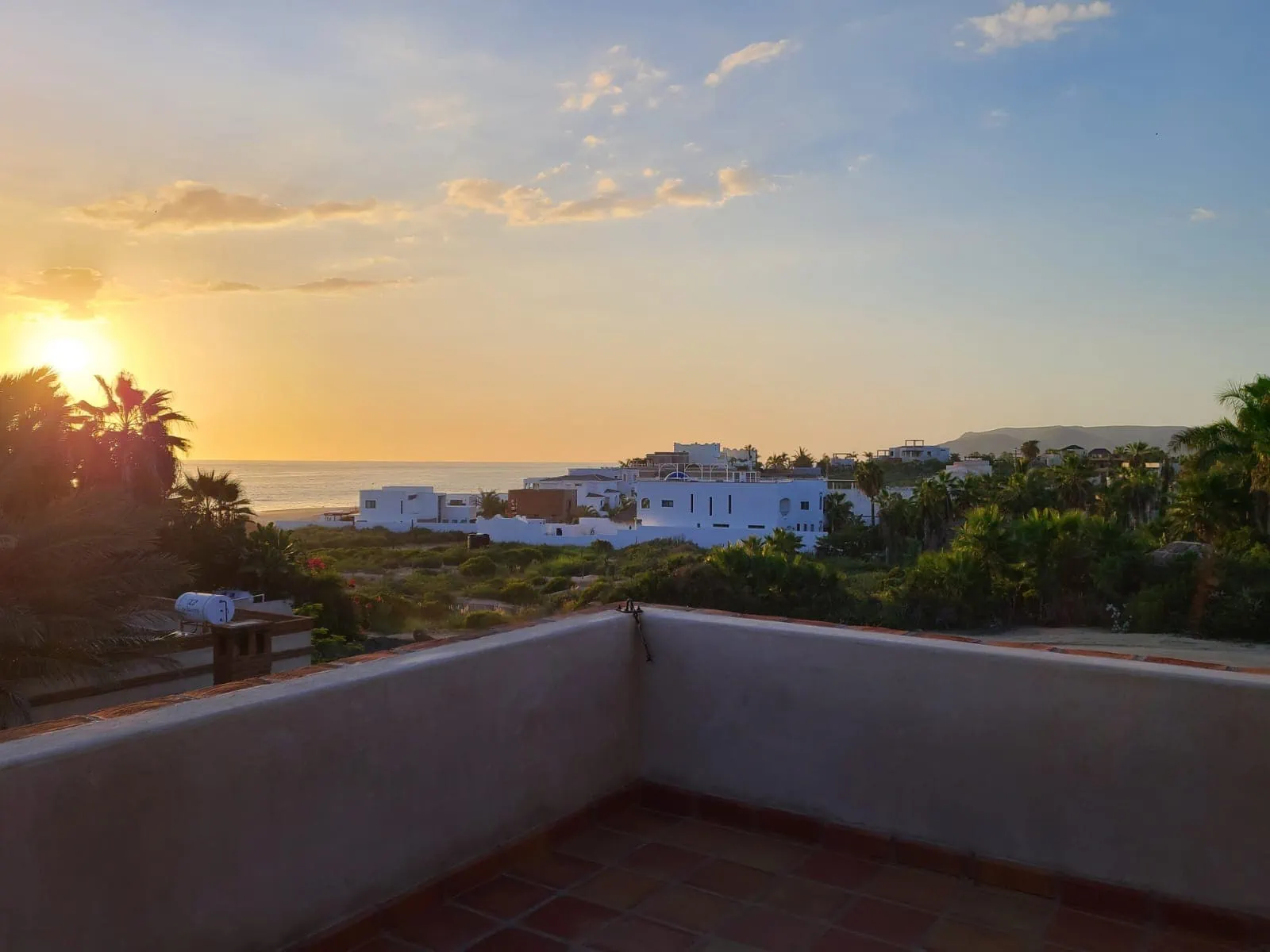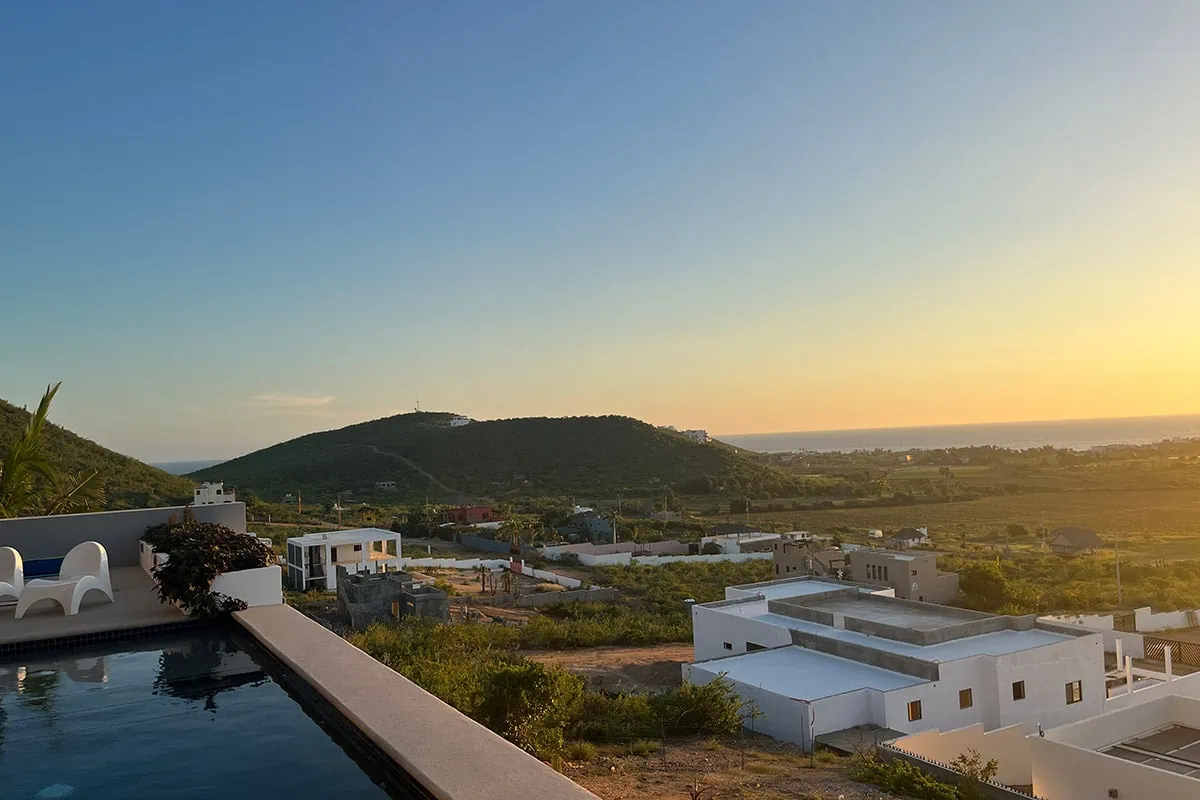About After the Storm's Program
This is an intensive therapeutic program grounded in our 4C Framework™, in a beautiful, healing environment far from the pressure and stresses of home.
Our program combines evidence-based therapeutic programming, community engagement, and wellness practices that empower individuals to reclaim their lives.
We maintain a 24-hour timetable designed to optimize conditions for recovery, supporting clients with consistent structure and around-the-clock care.
Our robust programming supports our 3-pronged approach to treatment:
- Addressing surface-level usage behaviors
- Investigating underlying causes and trauma (intensive therapeutic programming)
- Practical application planning to sustain learning and new behaviors (transition planning and aftercare)
Modality and Approach to Addiction
We follow a Biopsychosocial-spiritual Model, which asserts that there is no one single “cause” of addiction, and by extension, no one single treatment that is superior to others. Rather, addiction is a culmination of ways that one has been wounded in different, but critically connected, areas of life.
Many cutting-edge views of addiction are aligned with our belief that any addictive behavior is aimed at finding a sense of safety after our coping and natural resiliency have been overwhelmed.
We view substance use as a behavior, and trauma-informed care and evidence-based activities delve beneath the surface to address the underlying causes of addiction. The program is designed to treat comorbid issues, in agreeing with the proposition that trauma and addiction are usually intertwined.
Our program is, at its core, built upon a Humanistic, Rogerian approach that is centered around the person. We are steadfast in our person-centered belief that each individual is the expert on themselves. Recovery journeys are unique and deserve personalized attention. We collaborate with clients to tailor their recovery work towards what is most meaningful to them, and empower them to make informed decisions throughout the program and their recovery journey.
Additionally, nature can act as a powerful catalyst for change. Immersion in the peace and wonder of an environment can facilitate comfortable shifts in perspective and offer moments of serenity and self-discovery. A profound external shift can help to facilitate an internal shift. Our destination locale offers clients the opportunity to get away from the stresses and triggers of a home environment, where they can fully focus on their recovery work.
The 4 C Framework™: Compassion, Community, Connection Consistency
We encapsulate our inclusive, person-centered approach in our 4C Framework™ for recovery - an inclusive framework that is complementary to whatever approaches a client resonates with.
This framework is a practical and inclusive system that meets you wherever you are on your recovery journey.
It is a bedrock for creating a safe space to ask: “How do I understand myself as I am, so that I can choose how I want to change?”
Click the tiles below for more information.
The 4C Framework™ permeates everything we do at After the Storm.
The concepts of co-regulation and relational trauma posit that not much else can deeply wound humans as much as forced loneliness and shame, and much trauma stems from chaotically unstable environments and relationships that are inconsistent and can’t be trusted.
We want someone to know as soon as they call us, that we will be looking for ways to offer unwavering support and remain as close to them as they need us to be.
Elements of Our Program
Far more than just a relaxing getaway. We aim to empower clients with the tools they need to find and introduce true change and healing, so our program consists of a variety of different ways to absorb new information and experiences.
As is quite common in the addictions field, much of the program revolves around group work – from group therapy sessions, to PsychoEducation sessions, to more informal group activities – encouraging group cohesion, connection, and community.
Individual therapy remains a focal point to provide a space to bring up more private matters – personal traumas, struggles, and, hopefully, successes!
Facilitated by a highly-trained and experienced therapist, the program is filled with clinically-relevant information and approaches, but delivered in an accessible and responsible way.
The program introduces (or reintroduces) clients to exercises created to specifically treat Post-Traumatic Stress Disorder and employs other exercises/activities to encourage a sense of community involvement (from Group therapy to lounging by the private pool), personal empowerment (eg, learning to set emotional and interpersonal boundaries), and, most important, a sense of safety (learned through co-regulation).
It employs treatment interventions and modalities from a number of different philosophical perspectives, including:
- Cognitive-Behavioural Therapy (CBT)
- Dialectical-Behavioural Therapy (DBT)
- Eye-Movement Desensitisation and Reprocessing (EMDR)
- Accelerated Experiential Dynamic Psychotherapy (AEDP)
- Internal Family Systems (IFS)
- Mindfulness-Based Therapies (MBT).
Autonomy, choice, and surrounding yourself with others trying to change in the same way can be critical components of recovery, so we stress the importance of and membership in a community recovery group. However, in alignment with our person-centered and individualized approach, we do our best not to present any views that are not biased towards one program or another. We respect clients’ right to choose their own recovery journey, including whatever program feels right to them, whether that’s S.M.A.R.T. Recovery, a 12-step group, Rational Recovery, or anything else.
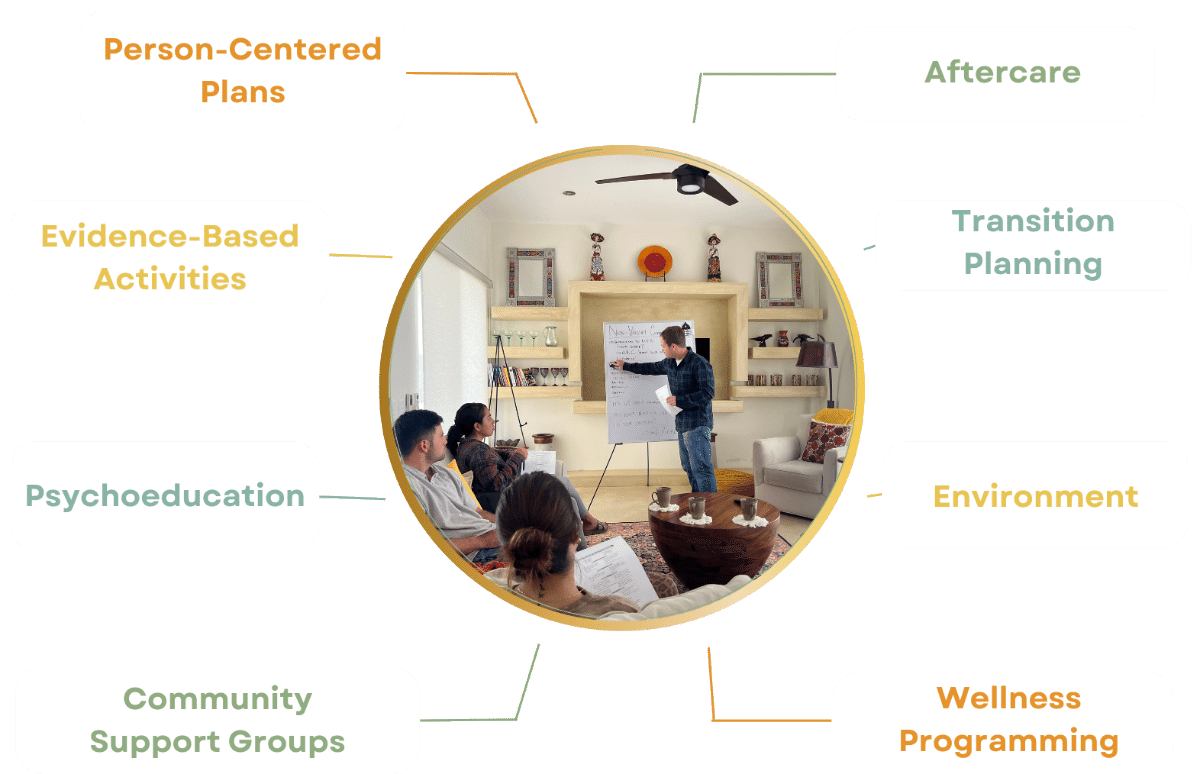
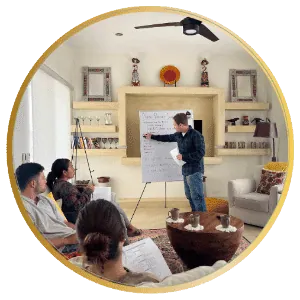
Recovery journeys are unique and deserve personalized attention. We collaborate with clients to tailor their recovery work towards what is most meaningful to them, and empower them to make informed decisions throughout the program and their recovery journey.
Trauma-informed care and evidence-based activities delve beneath the surface to address the underlying causes of addiction.
Fosters understanding of addiction behaviors and empowers conscious steps toward meaningful change.
Access to multiple options provides our clients the opportunity to discover which approaches resonate with them.
Designed during Transition Planning, clients have access to Counselor support, check-ins with staff, and alumni support group.
Weekly sessions support clients in developing a plan to sustain their progress and establishing equilibrium as they return to their home environments.
Immersion in the peace and wonder of an environment can facilitate comfortable shifts in perspective and offer moments of serenity and self-discovery. Catalyst for change. External shift can help facilitate an internal shift.
Attends to clients' physical and biological needs, including nourishing health-based meal plans and rejuvenating practices such as yoga and hiking.
Transition Planning and Aftercare
Our commitment to our clients and to community goes beyond an individual’s time at After the Storm. We know our program is one step on a longer journey, so we’ve developed a robust Transition Planning component to our program. We begin Transition Planning the moment a client arrives at our center. Clients work with a certified, professional coach during weekly sessions, which are designed to prepare clients to sustain their learning and build support networks as they return to their home environments. We hope that clients will carry our 4C’s home with them as they continue their journey. Our Transition Planning sessions create an even more individualized program as clients are given time and support to focus on identifying resources unique to their home environment and in alignment with the recovery approach that resonates most with them. We will design each individual’s Aftercare plan during Transition Planning sessions in order to maintain consent and client buy-in, acknowledging that they are the expert on themselves. We offer our graduates monthly Counselor access during the first three months after graduation, monthly Coach access during the first three months after graduation, regular informal check-in’s with our staff, and our alumni support group.
Transition Planning & Community Support Groups
Transition Planning revolves around planning is for one’s move back to their home, taking stock of what they imagine it will be like, and what support they will need. Transition Planning is offered weekly to grant time for the area to be researched and for clients to decide what support(s) they wish to access. Clients will be encouraged to virtually meet with recovery groups and therapists in their area, so that upon their return home, clients will already have had an introduction to and be somewhat familiar with the resources available to them.
PsychoEducation - Coping Skills and Strategies + Demystifying Addiction
Psycho Education (PE), as it appears in our program, can be thought of like a classroom-style lecture. It is a powerful vehicle for us to deliver information that, among other things, demystifies addiction, presents useful new information to consider, and acknowledges unique individual needs. Psychoeducation fosters an understanding of addiction behaviors and empowers conscious steps toward meaningful change.
PE is offered twice per week, there are 8 sessions in total. 4 core topics are chosen by the clinical director, who has deemed these topics universally important. The other topics are chosen by clients from a “pool” of curated topics. This is a very deliberate attempt to follow-through on our individualistic approach and distribute important information that the clients deem to be the most relevant to their circumstances. Note: in a conscious effort to build a robust Aftercare program, Transition Planning is not on the list of PE topics because we have made it a separate ongoing discussion, taking place weekly.
Consistent Themes
- Grounding
- Introspection/Exploration
- Celebrating Resiliency
- Shame
Core Topics
- "Window of tolerance"
- Stages of Change Model
- Non-Violent Communication
- Setting Boundaries
Topic Pool
- Recovery Capital
- Transition Planning
- Relationships (With Ourselves)
- Relationships (Interpersonal)
- "Labels" and Language
- Choices and Commitment
- "Success" vs "Relapse"
- Importance of Physical Hygiene (ex: Sleep)
Finally, we also like to acknowledge that our pool of topics is nowhere near exhaustive. We welcome clients to bring topics that would benefit the groups’ journey and that they would like to talk more about.
Contact Us for More Information
Call us, or fill out the below form to learn more about starting on a journey of healing, growth, and empowerment at After the Storm. Together, we can overcome the storms of addiction and emerge into a brighter, healthier future.
Addiction is not a moral failing, each client is a unique person who has been dealing with pain to the best of their ability and we will approach them with deep understanding and empathy.
Compassion is the bedrock of a safe space where clients can freely express vulnerability, openness, and honesty.
Basically, the client is the expert on themselves.
Shared and inclusive experience where clients feel valued and a part of something. Safe in a non-judgmental space.
Connection with self, with others, with nature, with spirituality: enhancing awareness and understanding. It reestablishes domains for mental wellness—emotional, motivational, spiritual, physical, intellectual, and social.
Care that combines competency, structure, and boundaries with unconditional positive regard. Consistent behaviors and expectations build trust, safety, and empowerment.
